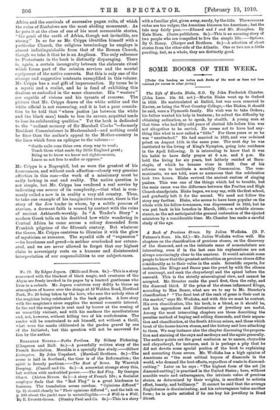SOME BOOKS OF THE WEEK.
[Under this heading we notice such Books of the week as have not bin reserved for review in other forms.] The Life of Martin Blake, B.D. By John Frederick Chanter. (John Lane. 10s. 6d. net.)—Martin Blake went up to Oxford in 1610. He matriculated at Balliol, but was soon removed to Exeter, as being the West Country College,—the Blakes, it should be said, were a Plymouth family. His wish was to take Orders ; his father wanted his help in business ; he solved the difficulty by obtaining ordination, so to speak, by stealth. A young man at that time who had fifty-odd years of clerical life before him was not altogether to be envied. He seems not to have had any- thing like what is now called a "title." For three years or so he was "unattached." He had married in 1620, and was ordained priest on August 11th in the same year. The next day he was instituted to the living of King's Nympton, going into residence in the April following. It is interesting to know that it was his habit to have daily prayer at 6 a.m. and 8 p.m. He held the living for six years, but latterly resided at Barn- staple, of which he became vicar in 1628. One of his reforms was to institute a monthly Communion. The com- municants, we are told, were so numerous that the celebration took two hours. Blake revived the ancient custom of singing psalms. This was one of the things which led to trouble, but the main cause was the difference between the Puritan and High Church standpoints. Blake began, we may say, with the first school, and gradually left it for the second. We need not follow the story any further. Blake, who seems to have been popular on the whole with his fellow-townsmen, was dispossessed in 1655, but he was put back in his benefice in March, 1660,—a notable circum- stance, as the act anticipated the general restoration of the ejected ministers by a considerable time. Mr. Chanter has made a careful study of the age.








































 Previous page
Previous page